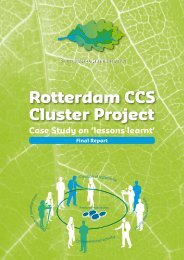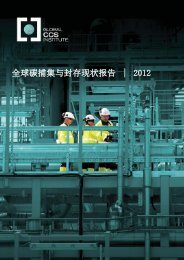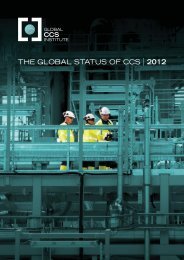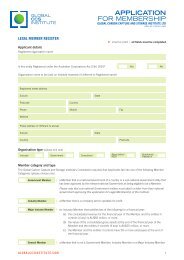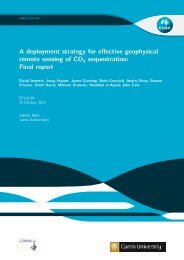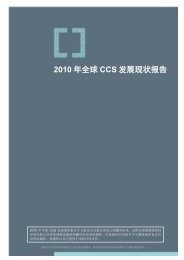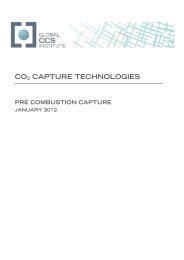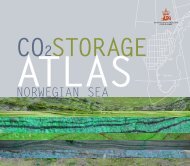Perceptions of CO2 Report - Global CCS Institute
Perceptions of CO2 Report - Global CCS Institute
Perceptions of CO2 Report - Global CCS Institute
- No tags were found...
You also want an ePaper? Increase the reach of your titles
YUMPU automatically turns print PDFs into web optimized ePapers that Google loves.
9.2 Recommendations9.2.1 NEED FOR EFFORTS TO PROMOTE DIALOGUE AND UNDERSTANDING ABOUT <strong>CCS</strong>TO INCORPORATE INFORMATION ON CO 2The demonstration <strong>of</strong> the limited knowledge base <strong>of</strong> respondents in this research highlights theneed for communicators to focus on the education <strong>of</strong> the general public about CO 2 ’s properties,sources, uses and effects, and especially the basic cause-effect relationship between CO 2 levelsand climate change. Prior to receiving information, the majority <strong>of</strong> respondents did not provide adefinitive response when asked to scale and report their perceptions. This may demonstrate that alack <strong>of</strong> knowledge about CO 2 is associated with an absence <strong>of</strong> clarity and certainty about how toperceive it. Therefore opportunity and motivation exists for communicators to explain the natureand properties <strong>of</strong> CO 2 .9.2.2 NEED FOR BALANCED AND COMPLETE INFORMATION ONO CO 2 ’S PROPERTIESParticularly important to communicate are CO 2 ’s effects on humans and the environment (e.g.,potential for soot-like effects and toxicity.) Also important are the issues <strong>of</strong> presumed risk andnatural hazard issues (e.g., earthquakes.) The strongest influence on <strong>CCS</strong> perceptions wasexerted by concerns <strong>of</strong> the risk <strong>of</strong> <strong>CCS</strong> on human health, which had a negative impact on <strong>CCS</strong>impressions. This result shows quantitatively that risk communication considerations are one <strong>of</strong> thebiggest issues to be addressed in developing public understanding <strong>of</strong> <strong>CCS</strong>.9.2.3 NEED TO ADDRESS TOPICS DEEMED IMPORTANT BY RESPONDENTSThe variation <strong>of</strong> reactions, anxieties, and beliefs amongst respondents highlights the importance <strong>of</strong>accounting for these in communication and education efforts. Essentially, in addition to firstinforming on the properties <strong>of</strong> CO 2 , communications about <strong>CCS</strong> must also account for a widerange <strong>of</strong> typical misperceptions regarding CO 2 . It is worth noting that perceiving CO 2 as usefulmakes respondents perceive <strong>CCS</strong> as more useful. The same can be said about perceiving CO 2 asmore dangerous; it also makes respondents perceive <strong>CCS</strong> as more dangerous. The fact thatrespondents considered descriptions <strong>of</strong> CO 2 ’s natural locations and its behaviour in <strong>CCS</strong> to beimportant supported the researchers’ choice to include basic and wide-ranging information in thesurvey, and should similarly influence future communication decisions.9.2.4 NEED FOR CARE IN DESCRIBING CO 2 NATURAL PHENOMENAIt is important to present open and transparent information, such as on Lake Nyos and MtMammoth (both the positive and negative sides). The information on “CO 2 natural phenomena”(especially on Mt Mammoth) could change <strong>CCS</strong> impressions in a negative direction, becausesome respondents might have increased concerns about the risks and dangers <strong>of</strong> <strong>CCS</strong> byperceiving the information (such as that provided about Lake Nyos or Mt Mammoth) as ananalogue <strong>of</strong> CO 2 leakage in <strong>CCS</strong> (as was seen in the interviews and focus groups). Thereforemore detailed explanations <strong>of</strong> the differences between an event such as Mt Mammoth and thepotential consequences <strong>of</strong> CO 2 leakage in <strong>CCS</strong> are required.50 | Understanding how individuals perceive carbon dioxide




